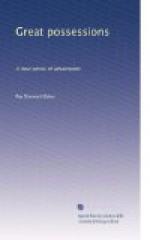At this Horace began to look seriously worried. The idea that any one could get away from him anything that he possessed, especially without his knowledge, was terrible to him.
“What do you mean, Mr. Grayson?”
He had been calling me “David,” but he now returned sharply to “Mister.” In our country when we “Mister” a friend something serious is about to happen. It’s the signal for general mobilization.
I continued to look Horace rather coldly and severely in the eye.
“Yes,” said I, “I’ve acquired a share in that field which I shall not soon surrender.”
An unmistakable dogged look came into Horace’s face, the look inherited from generations of land-owning, home-defending, fighting ancestors. Horace is New England of New England.
“Yes,” I said, “I have already had two or three crops from that field.”
“Huh!” said Horace. “I’ve cut the grass and I’ve cut the rowen every year since you bin here. What’s more, I’ve got the money fer it in the bank.”
He tapped his fingers on the top of the wall.
“Nevertheless, Horace,” said I, “I’ve got my crops, also, from that field, and a steady income, too.”
“What crops?”
“Well, Eve just now been gathering in one of them. What do you think of the value of the fleabane, and the daisies, and the yellow five-finger in that field?”
“Huh!” said Horace.
“Well, I’ve just been cropping them. And have you observed the wind in the grass—and those shadows along the southern wall? Aren’t they valuable?”
“Huh!” said Horace.
“I’ve rarely seen anything more beautiful,” I said, “than this field and the view across it—I’m taking that crop now, and later I shall gather in the rowen of goldenrod and aster, and the red and yellow of the maple trees—and store it all away in my bank—to live on next winter.”
It was some time before either of us spoke again, but I could see from the corner of my eye that mighty things were going on inside of Horace; and suddenly he broke out into a big laugh and clapped his knee with his hand in a way he has.
“Is that all!” said Horace.
I think it only confirmed him in the light esteem in which he held me. Though I showed him unmeasured wealth in his own fields, ungathered crops of new enjoyment, he was unwilling to take them, but was content with hay. It is a strange thing to me, and a sad one, how many of our farmers (and be it said in a whisper, other people, too) own their lands without ever really possessing them: and let the most precious crops of the good earth go to waste.
After that, for a long time, Horace loved to joke me about my crops and his. A joke with Horace is a durable possession.
“S’pose you think that’s your field,” he’d say.
“The best part of it,” I’d return, “but you can have all I’ve taken, and there’ll still be enough for both of us.”




